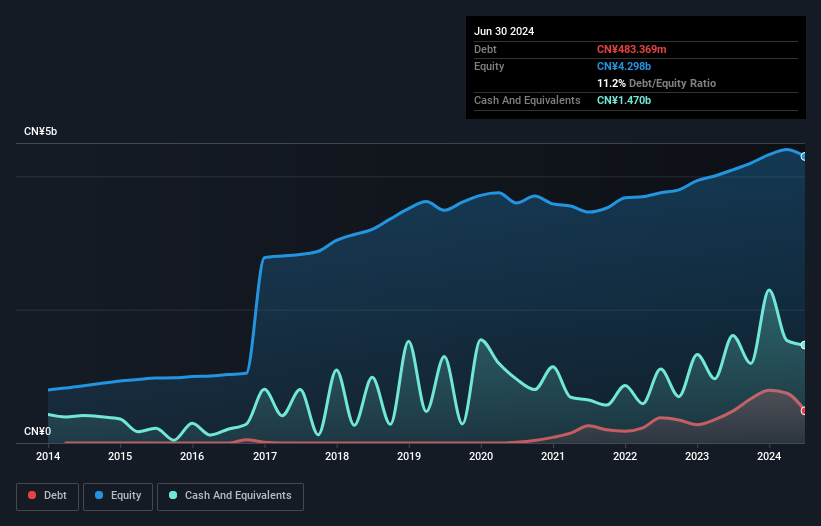Goldcard Smart Group (SZSE:300349) Has A Pretty Healthy Balance Sheet
Howard Marks put it nicely when he said that, rather than worrying about share price volatility, 'The possibility of permanent loss is the risk I worry about... and every practical investor I know worries about.' So it might be obvious that you need to consider debt, when you think about how risky any given stock is, because too much debt can sink a company. We note that Goldcard Smart Group Co., Ltd. (SZSE:300349) does have debt on its balance sheet. But is this debt a concern to shareholders?
What Risk Does Debt Bring?
Debt assists a business until the business has trouble paying it off, either with new capital or with free cash flow. In the worst case scenario, a company can go bankrupt if it cannot pay its creditors. However, a more common (but still painful) scenario is that it has to raise new equity capital at a low price, thus permanently diluting shareholders. Having said that, the most common situation is where a company manages its debt reasonably well - and to its own advantage. The first thing to do when considering how much debt a business uses is to look at its cash and debt together.
View our latest analysis for Goldcard Smart Group
What Is Goldcard Smart Group's Net Debt?
As you can see below, Goldcard Smart Group had CN¥483.4m of debt, at June 2024, which is about the same as the year before. You can click the chart for greater detail. However, its balance sheet shows it holds CN¥1.47b in cash, so it actually has CN¥986.6m net cash.

How Strong Is Goldcard Smart Group's Balance Sheet?
We can see from the most recent balance sheet that Goldcard Smart Group had liabilities of CN¥1.91b falling due within a year, and liabilities of CN¥525.1m due beyond that. Offsetting these obligations, it had cash of CN¥1.47b as well as receivables valued at CN¥2.12b due within 12 months. So it actually has CN¥1.16b more liquid assets than total liabilities.
This excess liquidity suggests that Goldcard Smart Group is taking a careful approach to debt. Due to its strong net asset position, it is not likely to face issues with its lenders. Simply put, the fact that Goldcard Smart Group has more cash than debt is arguably a good indication that it can manage its debt safely.
Also good is that Goldcard Smart Group grew its EBIT at 16% over the last year, further increasing its ability to manage debt. There's no doubt that we learn most about debt from the balance sheet. But it is future earnings, more than anything, that will determine Goldcard Smart Group's ability to maintain a healthy balance sheet going forward. So if you're focused on the future you can check out this free report showing analyst profit forecasts.
Finally, while the tax-man may adore accounting profits, lenders only accept cold hard cash. While Goldcard Smart Group has net cash on its balance sheet, it's still worth taking a look at its ability to convert earnings before interest and tax (EBIT) to free cash flow, to help us understand how quickly it is building (or eroding) that cash balance. In the last three years, Goldcard Smart Group created free cash flow amounting to 8.5% of its EBIT, an uninspiring performance. That limp level of cash conversion undermines its ability to manage and pay down debt.
Summing Up
While it is always sensible to investigate a company's debt, in this case Goldcard Smart Group has CN¥986.6m in net cash and a decent-looking balance sheet. And we liked the look of last year's 16% year-on-year EBIT growth. So we don't think Goldcard Smart Group's use of debt is risky. The balance sheet is clearly the area to focus on when you are analysing debt. But ultimately, every company can contain risks that exist outside of the balance sheet. For example - Goldcard Smart Group has 1 warning sign we think you should be aware of.
Of course, if you're the type of investor who prefers buying stocks without the burden of debt, then don't hesitate to discover our exclusive list of net cash growth stocks, today.
Have feedback on this article? Concerned about the content? Get in touch with us directly. Alternatively, email editorial-team (at) simplywallst.com.
This article by Simply Wall St is general in nature. We provide commentary based on historical data and analyst forecasts only using an unbiased methodology and our articles are not intended to be financial advice. It does not constitute a recommendation to buy or sell any stock, and does not take account of your objectives, or your financial situation. We aim to bring you long-term focused analysis driven by fundamental data. Note that our analysis may not factor in the latest price-sensitive company announcements or qualitative material. Simply Wall St has no position in any stocks mentioned.
 Index Options
Index Options CME Group
CME Group Nasdaq
Nasdaq Cboe
Cboe TradingView
TradingView Wall Street Journal
Wall Street Journal